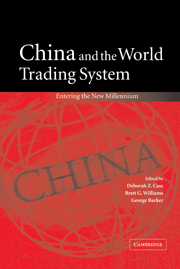Book contents
- Frontmatter
- Contents
- List of figures
- List of tables
- List of contributors
- Preface
- Acknowledgements
- Abbreviations and acronyms
- Introduction: China and the reshaping of the World Trade Organization
- PART I The world trading system
- PART II The accession
- PART III China – the domestic sphere
- PART IV Trade in goods
- PART V Trade in services and competition policy
- 13 WTO membership and professional services regulation in China
- 14 The impact of China's WTO accession upon regulation of the distribution and logistics industries in China
- 15 Regulating the new economy: implications of WTO accession for telecommunications and e-commerce in China
- 16 Segregation and convergence: the Chinese dilemma for financial services sectors
- 17 Adopting a competition law in China
- PART VI Intellectual property
- PART VII Dispute settlement
- Select bibliography
- Index
15 - Regulating the new economy: implications of WTO accession for telecommunications and e-commerce in China
Published online by Cambridge University Press: 28 July 2009
- Frontmatter
- Contents
- List of figures
- List of tables
- List of contributors
- Preface
- Acknowledgements
- Abbreviations and acronyms
- Introduction: China and the reshaping of the World Trade Organization
- PART I The world trading system
- PART II The accession
- PART III China – the domestic sphere
- PART IV Trade in goods
- PART V Trade in services and competition policy
- 13 WTO membership and professional services regulation in China
- 14 The impact of China's WTO accession upon regulation of the distribution and logistics industries in China
- 15 Regulating the new economy: implications of WTO accession for telecommunications and e-commerce in China
- 16 Segregation and convergence: the Chinese dilemma for financial services sectors
- 17 Adopting a competition law in China
- PART VI Intellectual property
- PART VII Dispute settlement
- Select bibliography
- Index
Summary
Introduction
This chapter examines the way in which GATS rules apply to telecommunication services and electronic commerce (e-commerce) in the Chinese context. Rather than list GATS articles, it discusses areas where current Chinese regulation may give rise to inconsistencies with China's WTO accession commitments.
The chapter focuses on the regulation of telecommunications services, including the telecommunications service fundamental to the internet. The chapter treats ‘internet services’ as composed of both ‘carriage’ services (the transmission of data over telecommunication networks) and ‘content’ (the data that are transmitted). It does not discuss internet content regulation. Some consideration, however, will be given to GATS provisions on domestic regulation with implications for e-commerce, focusing on new regulation on telecommunications, internet service providers (ISPs) and internet content providers (ICPs), with a brief discussion of encryption regulation.
The chapter is divided into five sections: the first section describes the priority given to China's telecommunications and internet industry and identifies key regulators; the second section considers the consistency of China's new telecommunications regulation with the WTO Reference Paper on Basic Telecommunications; the third examines the impact of China's market-access commitments on mobile services as an example of liberalization in a particular sector; the fourth details the debate surrounding the definition of ‘internet services’ at the WTO and its implications for the regulation of ISP services; and, finally, the fifth section discusses GATS provisions on domestic regulation in relation to recent Chinese encryption regulation.
- Type
- Chapter
- Information
- China and the World Trading SystemEntering the New Millennium, pp. 263 - 282Publisher: Cambridge University PressPrint publication year: 2003



